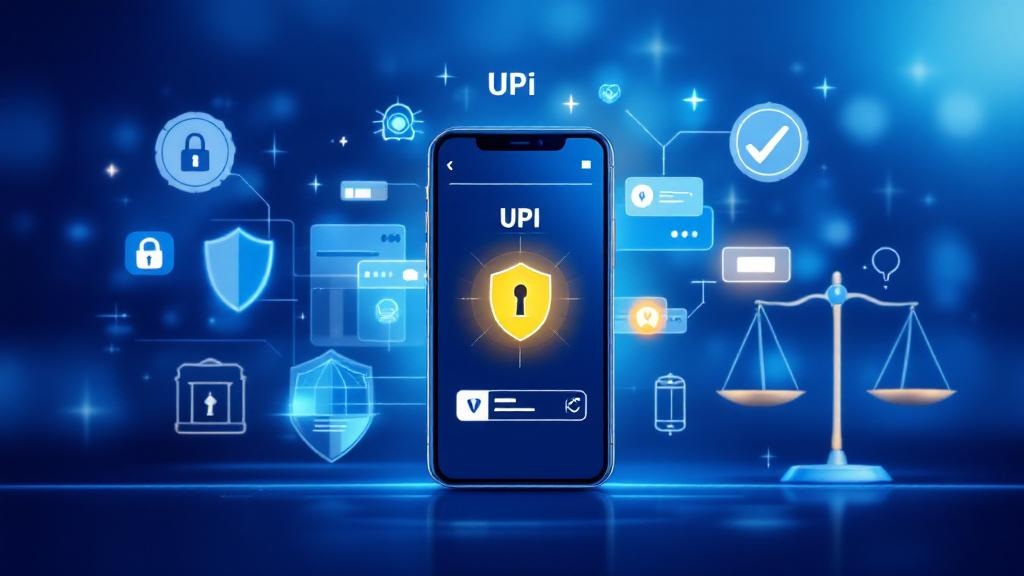Understand the legal protection available for UPI users. Learn about fraud prevention, legal actions, and the dispute resolution process for secure digital payments.
Introduction
The rise of UPI (Unified Payments Interface) has revolutionized digital payments in India, allowing millions to transfer funds securely and instantly. However, as with any form of online transaction, UPI is not immune to fraud and scams. With the growing prevalence of mobile payment fraud, UPI users must be aware of the legal protection for UPI users available to safeguard their digital transactions.
In this article, we’ll delve into the legal rights of UPI users, the legal action against UPI fraud, and how you can protect yourself from potential risks. Additionally, we’ll explore UPI safety guidelines, the UPI fraud refund policy, and cyber law for UPI transactions.
By understanding the legal framework and safety measures, UPI users can navigate the digital payment landscape with confidence.
What is UPI and Why It’s So Popular?
UPI is a digital payment system developed by the National Payments Corporation of India (NPCI). It allows users to transfer funds instantly using a mobile phone, without the need for an intermediary like a bank. UPI combines the convenience of mobile banking and the security of encryption, making it a favorite among Indian users.
Despite its popularity, the ease of UPI transactions has made it a target for fraudsters. Scams like OTP misuse, phishing attacks, and fake UPI apps have surfaced, leading to financial losses for users. Understanding UPI legal protection and cyber laws in India is crucial to mitigate these risks.
Legal Protection for UPI Users: What You Need to Know
1. UPI Legal Protection Framework
When it comes to digital payments, India has put various laws and guidelines in place to ensure that UPI users are protected. These include:
-
RBI Digital Payment Framework: The Reserve Bank of India (RBI) provides a robust framework that governs digital payments, ensuring that users are protected from fraud and that service providers maintain transparency and accountability.
-
NPCI Guidelines: As the organization behind UPI, NPCI sets strict operational and security standards for UPI apps and banks. These guidelines help in reducing the risks associated with UPI transactions.
2. UPI Safety Guidelines
To safeguard yourself from fraud while using UPI, it’s essential to follow UPI safety guidelines. Some of the most critical steps include:
-
Use official UPI apps: Always download UPI apps like Google Pay, PhonePe, or Paytm from trusted sources like the Google Play Store or Apple App Store.
-
Enable two-factor authentication: Make sure your UPI transactions require an OTP (One-Time Password) for added security.
-
Don’t share sensitive information: Never share your UPI PIN, OTP, or bank details with anyone, even if they claim to be from your bank or the UPI service provider.
-
Verify the recipient details: Before making any payment, always double-check the recipient’s name and UPI ID.
What to Do if You Become a Victim of UPI Fraud
Even after following all safety protocols, fraud may still occur. If you find yourself a victim of mobile payment fraud or UPI scam reporting, here are your legal options:
1. Bank Liability in UPI Fraud
Banks have a significant role in ensuring that UPI transactions are secure. According to the RBI’s digital payment framework, banks are held accountable for unauthorized transactions. If you report fraud within a reasonable time, they may be required to reimburse the lost amount.
-
Bank liability: If fraud is detected, you can hold the bank accountable for failing to prevent the transaction.
-
Time frame for reporting: Promptly report fraudulent transactions to your bank (usually within 3-7 days). Delayed reporting may reduce the likelihood of a refund.
2. UPI Fraud Refund Policy
Many users wonder about the UPI fraud refund policy. If you become a victim of fraud, the bank’s refund policy generally covers the loss if you act quickly. It’s important to keep track of your transaction history and promptly report any suspicious activity.
-
Filing a complaint: You can file a complaint with your bank’s customer grievance redressal team, which handles disputes related to UPI transactions.
-
Refund process: Once a complaint is lodged, the bank will initiate an investigation. If the transaction is deemed fraudulent, they will process a refund as per the policy.
3. UPI Dispute Resolution
Disputes arise when users feel their transactions were wrongly debited or when unauthorized payments occur. To resolve such issues:
-
NPCI Complaint Portal: Use the NPCI complaint portal to file a formal complaint. The portal allows users to escalate unresolved issues to NPCI for further investigation.
-
Legal recourse: If the dispute remains unresolved, you can seek legal recourse under electronic fund transfer laws and file a case with consumer courts or the cybercrime department.
Legal Rights of UPI Users
1. Consumer Protection in UPI Transactions
Under fintech consumer protection laws and the Consumer Protection Act, UPI users have the right to secure digital banking and protection from fraud. If a bank fails to prevent fraud or fails to resolve a complaint, you can seek legal assistance.
-
Right to compensation: Consumers have the right to seek compensation for losses incurred due to faulty services or negligence.
-
Right to information: Users are entitled to be informed about the security protocols and refund policies related to UPI transactions.
2. Cyber Law for UPI Transactions
India has a comprehensive set of cyber laws under the Information Technology Act, 2000, which governs online activities, including UPI transactions. These laws define cybercrimes like OTP misuse and provide a framework for prosecuting fraudsters.
-
Section 66C of the IT Act makes identity theft, including the misuse of UPI credentials, a punishable offense.
-
Cybercrime units: In case of cyber fraud, you can report the issue to your nearest cybercrime cell.
FAQs: Everything You Need to Know About Legal Protection for UPI Users
1. What should I do if I fall victim to a UPI fraud?
If you become a victim of UPI fraud, immediately report the incident to your bank, lodge a complaint on the NPCI complaint portal, and file a cybercrime report. The bank is obligated to investigate and potentially reimburse the stolen amount if reported within the prescribed time frame.
2. Can I get a refund if I lose money through UPI fraud?
Yes, banks usually offer a refund for UPI fraud, provided you report the fraud quickly. The UPI fraud refund policy allows users to get their money back if the transaction is unauthorized or fraudulent.
3. How do I protect myself from UPI scams?
To protect yourself, ensure you use trusted apps, never share sensitive information like your UPI PIN or OTP, and double-check recipient details before making a transfer. Additionally, enable two-factor authentication for extra security.
4. What is the role of RBI in protecting UPI users?
The RBI governs the digital payment framework, which ensures that UPI transactions are secure. They have set guidelines for fraud prevention, bank liabilities, and consumer protection, making it easier for users to get their money back in case of fraud.
5. What are my legal rights as a UPI user?
As a UPI user, you have the legal right to protection from fraud, transparency in transaction processes, and timely resolution of disputes. You also have the right to compensation if your bank fails to follow the necessary security protocols.
6. How do I report a UPI fraud incident?
You can report a UPI fraud incident by contacting your bank directly, using the NPCI complaint portal, or filing a complaint with your local cybercrime unit.
Conclusion
The increasing use of UPI has transformed digital payments in India, but it has also made users vulnerable to cybercrimes like UPI fraud. By understanding the legal protection for UPI users, you can safeguard your transactions and ensure that your rights are protected. Whether it’s UPI safety guidelines, cyber law for UPI transactions, or the UPI fraud refund policy, there are multiple ways to secure your funds and seek recourse if things go wrong.
Stay vigilant, be proactive about reporting fraud, and always follow best practices for secure digital banking. With the right knowledge and precautions, you can enjoy the convenience of UPI payments without worrying about fraud.








Comments (0)